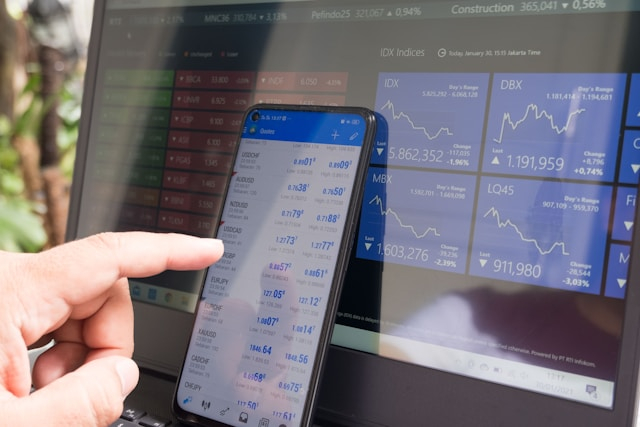How to Succeed in Prop Trading
If you’re thinking about diving into the world of proprietary trading—or “prop trading” as we call it—you’re probably wondering what it takes to actually succeed. I’ve spent years trading in both retail and prop environments, and I’ve seen a lot of traders come and go. Some make it, most don’t. But the ones who do succeed in prop trading tend to follow a few key principles.
What Is Prop Trading, Really?
Before we dive into the “how,” let’s make sure we’re clear on the “what.”
Prop trading is when a firm gives you their capital to trade. You’re not risking your own money. Instead, the firm funds your trading account and you share a percentage of the profits you make. The better you perform, the more buying power you get. Some firms also pay a base salary, but most are purely performance-based.
Sounds great, right? It is—but only if you’re prepared.
Tips for Succeeding in Prop Trading
See here top tips for succeeding in prop trading:
1. Learn the Game Before You Play It
This might sound obvious, but too many traders jump in without really understanding what they’re doing. Watching a few YouTube videos or reading a couple of Reddit threads won’t cut it. You need to know:
- How markets work
- Order flow and liquidity
- Risk management
- Technical and/or fundamental analysis
- Different asset classes (stocks, options, futures, forex)
Start small. Simulate trades. Practice until you understand not just how to win, but how to lose gracefully—because you will lose.
2. Discipline Over Everything
In prop trading, discipline separates the winners from the rest.
You don’t need to win every trade. In fact, most successful traders only win about 50–60% of the time. What matters more is how well you manage your risk, stick to your trading plan, and control your emotions.
You might have a strategy that works, but if you break your own rules during a rough day, you can wipe out a month’s worth of profits—or more.
Trust us: discipline is your best friend.

3. Risk Management: The Secret Weapon
The first thing any prop firm will teach you is how to manage risk. Why? Because they’re giving you their money—and they don’t want to lose it.
Here are a few key rules that have saved me more times than I can count:
- Never risk more than 1–2% of your capital on a single trade
- Always use stop-loss orders
- Don’t overtrade or revenge trade
- Know your daily loss limit—and respect it
Good trading isn’t about making big wins. It’s about protecting your capital so you can trade another day.
4. Develop Your Edge
An “edge” is what gives you a statistical advantage in the market. It could be anything from a specific chart pattern to a strategy based on economic news releases. The important part is that it works consistently over time.
You don’t need a perfect system—just one that works well enough and fits your personality. Some traders scalp the market, others swing trade. Some love fast-moving stocks, others prefer slow and steady plays.
Find what fits you, test it, and refine it.
5. Keep a Trading Journal
This one might not sound exciting, but it’s a game-changer.
Track every trade. Write down:
- Entry and exit points
- Position size
- The reason for the trade
- How you felt during the trade
- What went right or wrong
Over time, you’ll start to see patterns—both good and bad. You’ll learn more from your losses than your wins if you take the time to study them.
6. Accept That Losses Are Part of the Game
Even the best traders lose. The key is how you respond to losing.
Some people spiral after a bad trade and try to make it back right away. That usually leads to more losses. Others learn from the mistake and come back stronger.
Here’s the truth: you’ll lose trades. Probably often. But as long as you manage risk and keep your losses small, you can still be profitable.
7. Stay Mentally Sharp
Trading is a mental game. If you’re tired, emotional, or distracted, you’re probably going to make bad decisions.
Create a routine. Wake up early. Exercise. Eat well. Sleep enough. Take breaks. And when you’re not in the right mindset, it’s okay to skip a day of trading.
In fact, sometimes not trading is the smartest trade you can make.
8. Choose the Right Prop Firm
Not all prop firms are created equal. Some charge high fees, offer low payouts, or don’t give enough support to new traders.
Look for a firm that offers:
- Solid training and mentorship
- A realistic evaluation period
- Fair profit splits (70/30 or better)
- Risk controls that help you grow, not just restrict you
Ask questions. Read reviews. Talk to current or former traders if you can.
Final Thoughts
Prop trading isn’t easy, but it is possible. It takes time, patience, and a lot of self-awareness. You need to treat it like a business, not a game. There will be ups and downs, but if you’re disciplined and focused, you can absolutely succeed.
I’ve seen traders go from losing consistently to pulling in five figures a month—just by sticking to the basics and never giving up.
So, if you’re serious about this, study hard, trade smart, and never stop learning.
The forex market rewards those who are prepared.
Top-Tier Trusted Brokers
The table below contains links to 3rd party websites of our top partners from whom we receive compensation at no additional cost to you.























